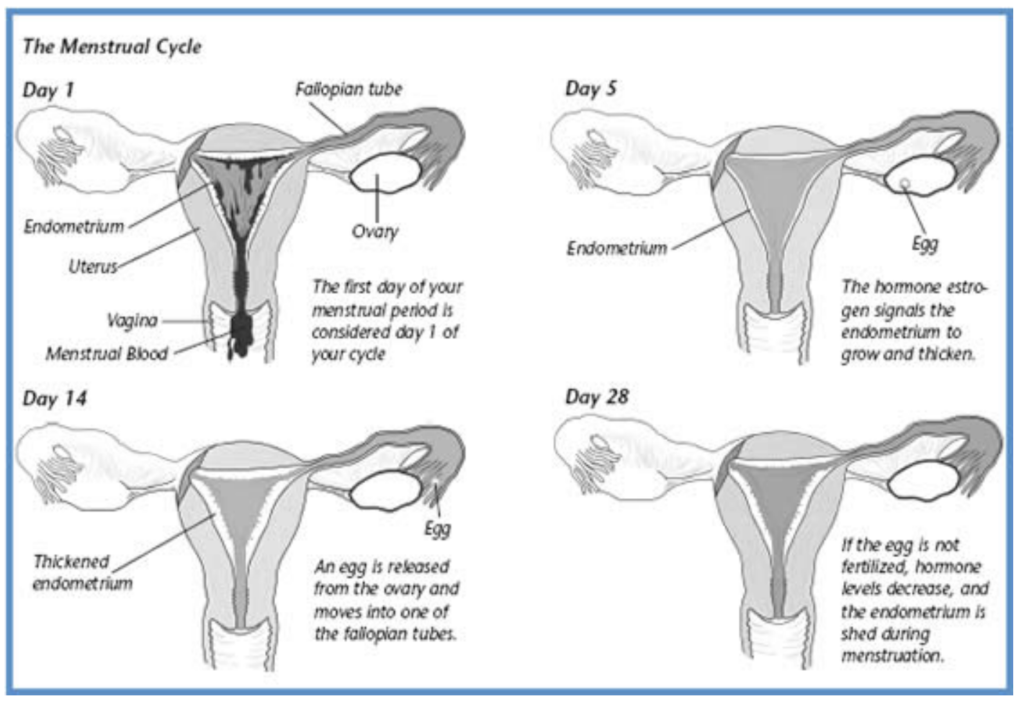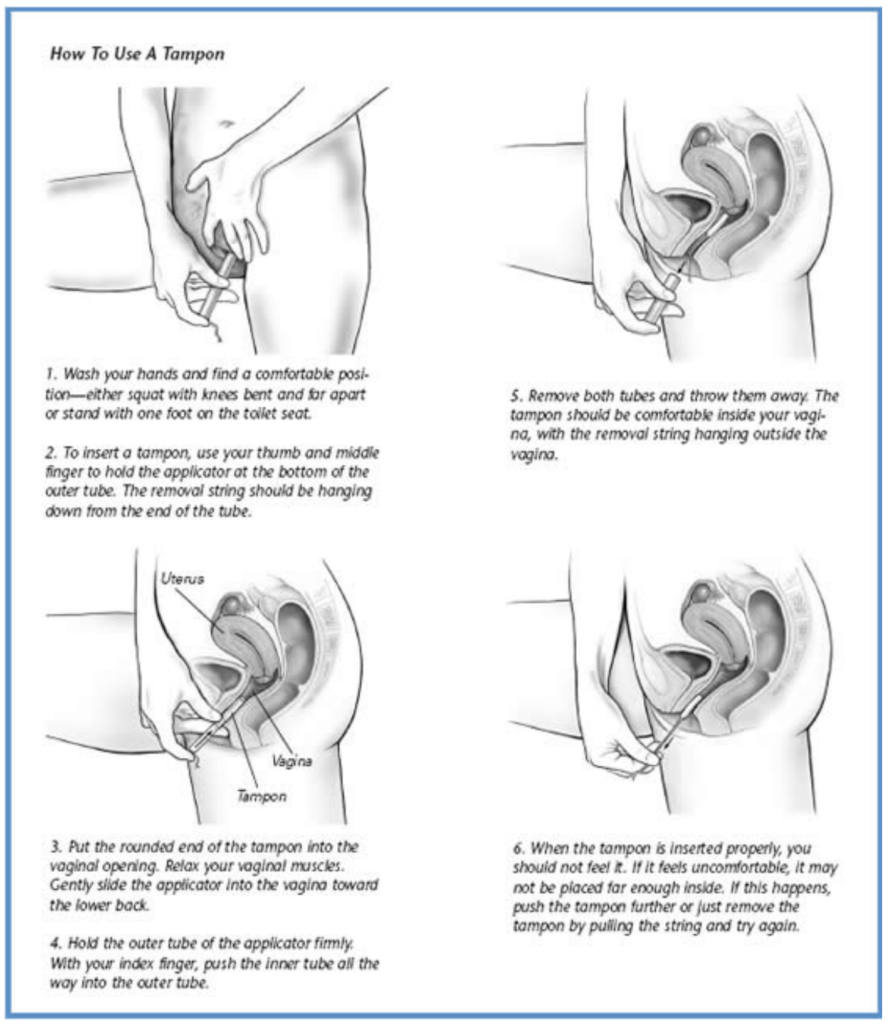Menstruation is a normal and healthy part of growing up. The discharge of blood and tissue from the lining of your uterus each month is often called the menstrual period. Menstruation can begin as early as age 8 years or as late as age 15 years, but it most often begins around age 11 or 12 years.
This page will help you learn more about:
- Your menstrual cycle
- What to expect each month
- How to use pads and tampons
The Menstrual Cycle
The start of menstruation is one of many signs that a girl is becoming a young woman. It means that it is now possible for a girl to get pregnant and have a baby. As you mature, your brain signals your body to produce hormones. These hormones serve as messengers to trigger your menstrual cycle. A part of that cycle is the monthly period.
An average menstrual cycle lasts 28-30 days, counting from the first day of one period to the first day of the next. Normal cycles can vary from 21 to 35 days.
Each month, after day 5 of your cycle, the lining of the uterus (endometrium) begins to grow and thicken. If a woman were to become pregnant, that extra-thick lining would help to nourish the developing fetus (a baby growing in the woman’s uterus).
Around cycle day 14, an egg is released from one of your ovaries. This is called ovulation. The egg moves into one of the two fallopian tubes connected to the uterus. If the egg is fertilized by a man’s sperm, it moves into the uterus, where it attaches to the lining, and begins to grow into a fetus.
Around cycle day 28, if an egg is not fertilized, the endometrium is shed by bleeding. The menstrual blood (a mix of blood and tissue from the inside of the uterus) flows from the uterus through the cervix into the vagina and out of the body. This bleeding is your menstrual period. Your period may last for 3-5 days. Some last as long as 7 days. The process then starts again in the next cycle.

When Your Period Will Start
Many girls have their first period around age 11 or 12 years. But periods can begin as early as age 8 years or as late as age 16 years. In most cases, the first period is very mild—only a few drops of blood or spotting may occur. Some girls have regular, monthly menstrual periods. Other girls might miss a period or have two periods in 1 month. This can be normal when a girl is first starting to menstruate. It can take some time for periods to become regular.
Common Questions About Menstruation
Will everyone be able to tell when I am having my period?
Not unless you tell them. Today’s pads are comfortable and thin. It is impossible to tell just by looking that someone is wearing one. Tampons are worn inside the vagina and cannot be seen through clothing.
Will I have to miss gym class or take things easy when I am having my period?
Not unless you want to. You might experience some cramping or feel a little bit more tired than usual, but it is not enough to put you on the sidelines. You can live a normal life when you are having your period. In fact, exercise can help relieve cramps and give you energy.
It seems like I am losing an awful lot of blood. Should I worry?
Chances are, what looks like a lot of blood to you is not really a lot of blood. It is just strange at first to see blood being lost when you have not been injured. Remember, the blood that you shed during your period is supposed to be lost. During an average period, you will lose only 4–12 teaspoons of menstrual fluid. But it might look like a lot more when you see it on your pad. If you are using more than 10 pads or tampons per day or soaking through a pad or tampon every hour, this may be a sign of problem. If you truly feel you are losing a great deal of blood, talk to your doctor. He or she will tell you whether it is normal or not, and what to do. Your doctor may prescribe iron pills if he or she feels you are losing too much iron in your blood.
How will I know when my period is about to start?
If you are keeping track on a calendar, and if your periods are regular, you should be able to tell each month about when your period will begin. If your periods are not regular, you might still have some signs. Some girls begin to feel mild cramps right before their periods begin. Others might feel bloated or have other symptoms. Sometimes, though, your periods can catch you by surprise. It is good to be prepared. Always carry an extra pad or tampon in your purse, just in case.
Can tampons be worn while swimming?
Yes. Tampons do not interfere with physical exercise, including swimming.
How to Keep Track
It is a good idea to use a calendar to keep track of your periods. Mark the first day your period starts on your calendar with an “X.” Count the first “X” as day 1. Keep counting the days until you have your next period. If you do this every month, you will be able to tell how many days there are between your periods. It will help you learn when your next period should start.
Personal Care
During your period, you can use pads, panty liners, or tampons to soak up the menstrual flow. You may want to use several of these products. Some girls like to use tampons on heavy-flow days, and pads or panty liners on lighter days. Some girls like to wear tampons during the day and pads at night. Some use products together.
Pads
Pads are worn inside your underwear to collect your menstrual flow. Pads come in different sizes, styles, and thicknesses. Some have “wings” that fold under your underwear to provide better protection. Some are extra-thick for heavy flows. Some contain deodorant.
Choose a pad based on your body size, the amount of flow, and what feels comfortable. Avoid pads with deodorant if they irritate your skin.
Most girls use pads when they have just started having periods. They should be changed about every 4–6 hours or whenever they seem full or begin to feel wet or uncomfortable. Some girls change their pads each time they urinate.
Panty Liners
Panty liners are thinner and shorter than pads. Use panty liners for days when your flow is light, like at the end of your period. You also can use panty liners with tampons for extra protection.
Tampons
Tampons are worn inside the vagina to catch the flow as it leaves the body (see box). Most come with plastic or cardboard applicators that are used to slide the tampon into your vagina. A short string attached to the end of the tampon hangs out of your vagina to let you remove it later.
Tampons come in different sizes and can absorb different amounts of blood flow. Look on the package to see how much the tampon will absorb.
Tampons should be changed after 4–6 hours. On the first days of your period, you may need to change them more often because your flow may be heavier.
Some girls may feel afraid to use tampons at first. Tampons might seem uncomfortable or hard to insert. A tampon should be comfortable to wear. Once inserted correctly, you should not feel it. Talk to your mother or another trusted adult when you feel ready to try tampons.

When Your Period Hurts
Many girls have mild cramps in the lower abdomen or pain in the lower back when their periods start. Cramping gives you a feeling of tightness and pain. This is normal. Some girls also go through other changes in the days or weeks before their menstrual periods start. The most common symptoms are:
- Bloating—a feeling of fullness in the abdomen
- Tender breasts
- Headache
- Feeling tired
- Mood swings
- Food cravings
There are ways to relieve your cramps and other symptoms. You can:
- Take over-the-counter pain medicines, like ibuprofen, acetaminophen, or aspirin
- Exercise
- Place a heating pad or hot water bottle on your stomach
Problems
Severe Cramps
Mild cramping with your period is normal. If you have severe cramps, nausea, or pain so intense that you cannot do your usual activities during your period or pain medication does not help, see your doctor.
Your doctor may be able to help relieve your symptoms. The first step is to note when the cramps or back pain occurs. Mark on a calendar when symptoms occur and when they are most severe. Show your calendar to your doctor and describe how you feel. Your doctor may want to do an exam or tests.
Amenorrhea
Some girls do not menstruate during their teenage years. For instance, some girls’ periods may never start or they may stop having periods completely. This is called amenorrhea.
There are many other reasons for a missed period. The most common reason is pregnancy. Other reasons you might miss your period include:
- Sudden change in weight
- Illness
- Stress
- Extreme exercise (such as running long distances each day)
- Hormone problems
- Taking certain medicines
A young woman should see her doctor if she has not started having periods by age 15 years or if she has not had a period for 3 months. (If you have had sex and think you might be pregnant, see your doctor right away.)
Heavy Bleeding
Some girls have heavier bleeding than others. If your periods are heavier than usual or go on for longer than a week, they may not be normal. In most cases, this is caused by problems with hormones. If bleeding occurs often or at the wrong time in your cycle, it could be a sign of a problem. See your doctor so that he or she can check for the cause of heavy bleeding.
Finally….
Menstruation is a normal, healthy process. In most cases, it does not affect your day-today activities. If you have any concerns about your menstrual cycle, discuss them with a trusted adult or your doctor.
Glossary
Amenorrhea: The absence of menstrual periods.
Cervix: The lower, narrow end of the uterus, which protrudes into the vagina.
Hormones: Substances produced by the body to control the functions of various organs.
Ovaries: Two glands, located on either side of the uterus, that contain the eggs released at ovulation and that produce hormones.
Ovulation: The release of an egg from one of the ovaries.
Uterus: A muscular organ located in the female pelvis that contains and nourishes the developing fetus during pregnancy.
Vagina: A tube-like structure surrounded by muscles leading from the uterus to the outside of the body.
Source: acog.org
